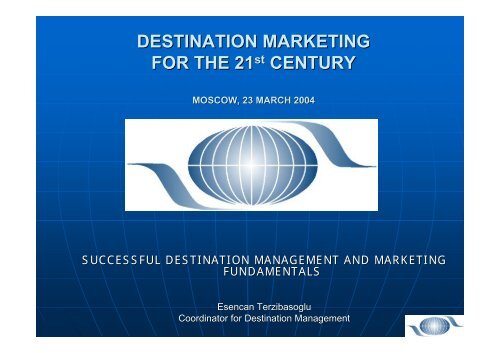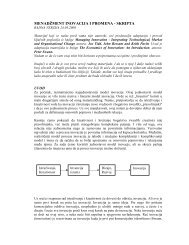DESTINATION MARKETING FOR THE 21st CENTURY
DESTINATION MARKETING FOR THE 21st CENTURY
DESTINATION MARKETING FOR THE 21st CENTURY
Create successful ePaper yourself
Turn your PDF publications into a flip-book with our unique Google optimized e-Paper software.
<strong>DESTINATION</strong> <strong>MARKETING</strong><br />
<strong>FOR</strong> <strong>THE</strong> 21 st <strong>CENTURY</strong><br />
MOSCOW, 23 MARCH 2004<br />
SUCCESSFUL <strong>DESTINATION</strong> MANAGEMENT AND <strong>MARKETING</strong><br />
FUNDAMENTALS<br />
Esencan Terzibasoglu<br />
Coordinator for Destination Management
<strong>DESTINATION</strong><br />
The fundamental unit on which all the many<br />
complex dimensions of tourism are based<br />
Basic unit of analysis in tourism<br />
A focal point in the development and delivery of<br />
tourism products and the implementation of tourism<br />
policy<br />
MOSCOW, 23 March 2004
DIMENSIONS OF A<br />
<strong>DESTINATION</strong><br />
Spatial<br />
characteristics:<br />
scale and<br />
boundry<br />
Host<br />
community<br />
elements<br />
Management<br />
(Supply)<br />
orientation<br />
Marketing<br />
(visitor)<br />
orientation<br />
MOSCOW, 23 March 2004
WORKING DEFINITION OF A<br />
LOCAL <strong>DESTINATION</strong><br />
“A A local tourism destination is a physical space in<br />
which a tourist spends at least one overnight. It<br />
includes tourism products such as support services<br />
and attractions and tourist resources within one<br />
day’s return travel time. It has physical and<br />
administrative boundries defining its management,<br />
and images and perceptions defining its market<br />
competitiveness. Local destinations incorporate<br />
various stakeholders often including a host<br />
community, and can nest and network to form<br />
larger destinations.”<br />
WTO Think –Tank 2-42<br />
4 December 2002 Madrid
<strong>DESTINATION</strong> POLICY<br />
(TOURISM POLICY)<br />
FOCUS ON MACRO- LEVEL POLICIES<br />
(CREATE AN OVERALL STRATEGY <strong>FOR</strong> TOURISM<br />
DEVELOPMENT AND PLANNING)<br />
DESIGNED <strong>FOR</strong> A LONG-TERM PERSPECTIVE<br />
CONSTRUCTED TO ALLOW AN ON-GOING, DYNAMIC<br />
SOCIAL AND ECONOMIC PROCESS<br />
MOSCOW, 23 March 2004
POLICY<br />
DEFINES <strong>THE</strong> RULE OF <strong>THE</strong> GAME<br />
PROVIDES GUIDANCE <strong>FOR</strong> ALL TOURISM STAKEHOLDERS<br />
PROVIDES A FRAMEWORK <strong>FOR</strong> DISCUSSIONS AT PUBLIC AND<br />
PRIVATE INDUSTRY LEVEL ON <strong>THE</strong> ROLE OF TOURISM AND ITS<br />
ECONOMIC AND SOCIAL CONTRIBUTIONS<br />
CREATES <strong>THE</strong> CONDITIONS WITHIN WHICH TOURISM CAN<br />
SUCCEED<br />
MANAGEMENT<br />
MICRO-LEVEL ACTIVITY IN WHICH <strong>THE</strong> HOST COMMUNITY AND<br />
<strong>THE</strong> TOURISM STAKEHOLDERS CARRY OUT <strong>THE</strong>IR INDIVIDUAL<br />
AND ORGANIZATIONAL RESPONSIBILITIES ON A DAILY BASIS,<br />
AIMING IN ACHIEVING <strong>THE</strong> MACRO-LEVEL VISION<br />
MOSCOW, 23 March 2004
COMPETITIVENESS<br />
Destinations<br />
compete for<br />
economic<br />
reasons with the aim of attracting more<br />
tourist expenditure.<br />
COMPARATIVE<br />
ADVANTAGES:<br />
natural and/or<br />
created resources<br />
COMPETITIVE<br />
ADVANTAGES:<br />
destination’s ability<br />
to use and mobilize<br />
resources effectively<br />
over the long term<br />
MOSCOW, 23 March 2004
+ A destination with abundant and diversified<br />
resources may not be competitive as another<br />
destination,<br />
which<br />
has relatively<br />
limited<br />
resources but has the ability to effectively utilize<br />
these resources.<br />
+ COMPETITIVENESS IS NO GUARANTEE <strong>FOR</strong> SUCCESS !<br />
SUCCESS/PER<strong>FOR</strong>MANCE OF A<br />
<strong>DESTINATION</strong> IS ASSESSED THROUGH <strong>THE</strong><br />
DEGREE OF BALANCE AMONG ECONOMIC,<br />
SOCIAL, CULTURAL AND POLITICAL<br />
DETERMINANTS<br />
MOSCOW, 23 March 2004
<strong>DESTINATION</strong> MANAGEMENT ORGANIZATION<br />
PROMOTION AND <strong>MARKETING</strong>:<br />
(D M O)<br />
identification of the strategic markets<br />
image management<br />
positioning, branding etc.<br />
BROADER CONTEXT OF RESPONSIBILITIES:<br />
quality management<br />
visitor management<br />
human resource development<br />
finance and capital management<br />
crisis management<br />
information and research management<br />
MOSCOW, 23 March 2004
The success of the destination<br />
(not totally) but largely<br />
depends on the performance level of the strategic and<br />
operational functions of the DMO.<br />
<strong>DESTINATION</strong> <strong>MARKETING</strong><br />
Covers all the activities and processes to bring buyers and<br />
sellers together.<br />
Focuses on responding to consumer demands and competitive<br />
positioning.<br />
Is a continuous coordinated set of activities associated with<br />
efficient distribution of products to high potential markets.<br />
Involves making decisions about the product,<br />
branding, the<br />
price, market segmentation, promotion and distribution.<br />
MOSCOW, 23 March 2004
<strong>DESTINATION</strong> <strong>MARKETING</strong> PROCESS<br />
Analyze your current situation<br />
Identify product(s)<br />
Select target market(s)<br />
Set objectives<br />
Implement promotion strategies<br />
Evaluate results<br />
MOSCOW, 23 March 2004
<strong>MARKETING</strong> FUNDAMENTALS<br />
Image<br />
Destination<br />
Brand<br />
Positioning<br />
Vision<br />
MOSCOW, 23 March 2004
<strong>THE</strong> SUCCESS OF A <strong>DESTINATION</strong> , TO A<br />
GREAT EXTENT, IS RELIANT ON ITS IMAGE<br />
The image is the cluster of all perceptions the<br />
customers hold for that destination.<br />
It is the aggregate of all the ideas,<br />
impressions and beliefs derived from direct<br />
experience and/or indirect information sources.<br />
Image<br />
is not static and homogeneous. It<br />
evolves and changes due to the internal and<br />
external factors.<br />
MOSCOW, 23 March 2004
How does a destination change its image<br />
Important role of NTOs and DMOs !<br />
Clearly understand the image and the factors<br />
influencing the image (research/measurement)<br />
Establish a strategic direction<br />
Convince as many stakeholders as possible to<br />
align with this strategic direction (monitoring)<br />
(image management)<br />
MOSCOW, 23 March 2004
<strong>DESTINATION</strong> BRAND<br />
The brand is the abstract of the destination’s<br />
identity, the way the destination wants to project<br />
itself in the market and be recognized (known).<br />
Brand is a promise, an anticipation, an<br />
expectation.<br />
<strong>DESTINATION</strong> POSITIONING<br />
Destination’s position in the market is how a<br />
destination is percieved by actual and potential<br />
visitors in terms of the experiences it provides<br />
relative to competing destinations.<br />
MOSCOW, 23 March 2004
<strong>DESTINATION</strong> VISION<br />
Vision is a created portrait or an<br />
overall picture of the<br />
desired future of the destination<br />
An essential component of tourism policy.<br />
Should integrate all the elements necessary for<br />
destination competitiveness.<br />
MOSCOW, 23 March 2004
CONCLUSIONS<br />
What are the most critical issues for a<br />
successful destination management <br />
Knowledge and understading the needs of the new tourist (image,<br />
branding, positioning),<br />
Improvement of collecting reliable data and competent anaysis of this<br />
data,<br />
Increased competitiveness of the destination,<br />
Management of new technologies,<br />
Innovation and tourism product management,<br />
Greater professionalism in human resource managemet,<br />
Synergy between all the skateholders in creating the destination n vision.<br />
Public – private parternship in the key areas of management and<br />
MOSCOW, 23 March 2004<br />
marketing
THANK YOU<br />
Esencan TERZIBASOGLU , Coordinator for Destination Management<br />
eterzibasoglu@world<br />
world-tourism.orgorg<br />
MOSCOW, 23 March 2004

















